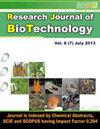研究 17-ꞵ 雌二醇对胶质母细胞瘤细胞系的体外治疗影响
IF 0.2
Q4 BIOTECHNOLOGY & APPLIED MICROBIOLOGY
引用次数: 0
摘要
胶质母细胞瘤(GBM)或 IV 级星形细胞瘤是中枢神经系统(CNS)中最具侵袭性和最常见的肿瘤。胶质母细胞瘤的治疗主要包括手术切除、放射治疗和/或化疗。然而,由于其浸润能力,几乎不可能完全切除肿瘤,而且还会复发。表皮生长因子受体(EGFR)的异常表达可在 GBM 中观察到,包括 EGFR 突变、重排和缺失。血脑屏障是阻止大分子进入大脑的主要障碍之一。因此,应该开发一种神经毒性较小的小分子药物来治疗 GBM 或其他与脑相关的疾病。以前的研究已经报道了 17-ꞵ 雌二醇在治疗乳腺癌方面的疗效,但对雌激素信号在胶质瘤的发生和发展中的治疗作用却知之甚少。雌二醇是一种小分子,分子量为 272.4 克/摩尔。它是一种亲脂分子,因此可以通过被动扩散穿过血脑屏障,可被视为治疗脑胶质瘤的一种治疗分子。本研究表明,17-ꞵ 雌二醇可抑制 GBM 细胞株的迁移和集落形成。此外,它还能诱导早期和晚期细胞凋亡,并使细胞周期停滞在细胞周期的 S 期。GBM 细胞株暴露于 E2 后,表皮生长因子受体和下游表皮生长因子受体相关蛋白的表达也会减少。这些结果表明,17-ꞵ 雌二醇可被视为治疗 GBM 的一种治疗分子。本文章由计算机程序翻译,如有差异,请以英文原文为准。
Study on in vitro therapeutic impact of 17-ꞵ Estradiol on Glioblastoma cell lines
Glioblastomas (GBM) or grade IV astrocytomas is the most aggressive and frequent tumor in the Central Nervous System (CNS). GBM treatment mainly consists of surgical resection and radio and/or chemotherapy. However, due to its infiltration capacity, it is practically impossible to completely extract the tumor and it relapses. Aberrant EGFR expression is observed in GBM including EGFR mutation, rearrangement and deletions. Blood brain barrier is one of the major obstacles which prevents the entry of larger molecules into the brain. Hence a small molecule, with lesser neurotoxicity should be developed in treating GBM or any other brain related diseases. Previous studies have reported the therapeutic potency of 17-ꞵ Estradiol in treating breast cancer, but little is known about the therapeutic role of estrogen signalling in the development and progression of gliomas. Estradiol being the small molecule has molecular weight of 272.4g/mol. It is a lipophilic molecule and therefore it can pass through the blood brain barrier by passive diffusion and could be considered as a therapeutic molecule in treating GBM. Present study showed that 17-ꞵ Estradiol inhibited the migration, colony formation in GBM cell lines. Further it induced early and late apoptosis and arrested the cell cycle at S-Phase of the cell cycle. EGFR and downstream EGFR associated protein expression were also reduced upon exposure of GBM cell lines to E2. These results show that 17-ꞵ Estradiol could be considered as a therapeutic molecule in GBM treatment.
求助全文
通过发布文献求助,成功后即可免费获取论文全文。
去求助
来源期刊

Research Journal of Biotechnology
BIOTECHNOLOGY & APPLIED MICROBIOLOGY-
CiteScore
0.60
自引率
0.00%
发文量
192
期刊介绍:
We invite you to contribute Research Papers / Short Communications / Review Papers:
-In any field of Biotechnology, Biochemistry, Microbiology and Industrial Microbiology, Soil Technology, Agriculture Biotechnology.
-in any field related to Food Biotechnology, Nutrition Biotechnology, Genetic Engineering and Commercial Biotechnology.
-in any field of Biotechnology related to Drugs and Pharmaceutical products for human beings, animals and plants.
-in any field related to Environmental Biotechnolgy, Waste Treatment of Liquids, Soilds and Gases; Sustainability.
-in inter-realted field of Chemical Sciences, Biological Sciences, Environmental Sciences and Life Sciences.
-in any field related to Biotechnological Engineering, Industrial Biotechnology and Instrumentation.
-in any field related to Nano-technology.
-in any field related to Plant Biotechnology.
 求助内容:
求助内容: 应助结果提醒方式:
应助结果提醒方式:


